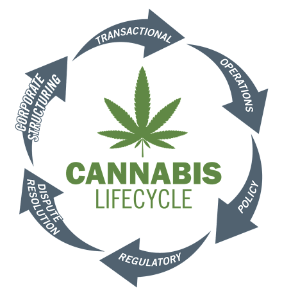
Cannabis
The multibillion dollar cannabis industry is rapidly growing both in the United States and globally. Our lawyers and policy professionals are accustomed to working with clients in heavily regulated industries and can help you achieve your business goals through the entire multidimensional cannabis lifecycle.
 We are experienced in working with clients whose businesses live in a constantly changing regulatory environment—and there is no business where that environment is changing as quickly as the cannabis industry. It remains the only industry in the world that is both legal and illegal within the same nation. These constraints—and related risks for investors and clients, are changing almost on a daily basis. Our cross-disciplinary and cross-border teams are both adept and nimble enough to help you navigate these challenges and reach your business goals throughout the lifecycle of the cannabis business.
We are experienced in working with clients whose businesses live in a constantly changing regulatory environment—and there is no business where that environment is changing as quickly as the cannabis industry. It remains the only industry in the world that is both legal and illegal within the same nation. These constraints—and related risks for investors and clients, are changing almost on a daily basis. Our cross-disciplinary and cross-border teams are both adept and nimble enough to help you navigate these challenges and reach your business goals throughout the lifecycle of the cannabis business.
We stay abreast of evolving legislative developments to help investors and other clients navigate the complex web of federal, state, and local laws and regulations. Since restrictions remain in federal law and in the laws of some states in the United States and in the laws in other jurisdictions, we evaluate the objectives of each client to determine how we can best assist in achieving them, while identifying and mitigating risk. Our globally integrated team can provide a full range of services.
CORPORATE STRUCTURING
We have the special knowledge needed to represent cannabis related companies from initial organization and financing, to mergers and acquisitions, and sales transactions.
TRANSACTIONAL
We have a sophisticated Corporate practice that assists clients with a wide range of transactional matters including, capital equity financing, debt financing, domestic and cross-border financing, mergers and acquisitions, joint ventures and affiliations, and tax structuring. We also assist public companies with their filings with the Securities and Exchange Commission and other agencies.
OPERATIONS
We have the experience to counsel clients on operational issues including agricultural operations, land and equipment leasing, processing, supply chain, packaging, and distribution. We also provide real estate, construction, intellectual property, and labor and employment services.
POLICY
We work to shape the laws and regulations that affect our clients in the cannabis space. We are in the room and at the table when discussions are being held about developing laws and regulations, and we provide critical input as to the implications of those decisions. We also educate decision makers on the implications of their actions before they happen.
REGULATORY
Compliance with national, state, and local requirements applicable to the industry is essential. We assist clients on matters including permitting and licensing requirements, water rights, safety and health, labor and employment, environmental, tax, and antitrust among others.
DISPUTE RESOLUTION
Similar to other industries, those involved in the cannabis industry will face disputes—both business and governmental—that will require experienced hands to resolve and if necessary, litigate. We handle negotiations, mediations, and arbitrations, as well as litigation and contentious matters around the world.
Thought Leadership
On 2 April 2025, President Trump announced a series of “reciprocal” tariffs on US imports from all countries. The tariffs apply at different rates by country, starting at a baseline of 10% and reaching as high as 50%.
The Hon. Jim Chalmers MP, Federal Treasurer and the Hon. Clare O'Neil MP, Minister for Housing, Minister for Homelessness issued a joint media release on 16 February 2025 titled "Albanese Government clamping down on foreign purchase of established homes and land banking".
The Australian Federal Government has just released its budget for 2025-26.
The nuclear energy industry continues to gain momentum and has a strong outlook for 2025 and beyond.

